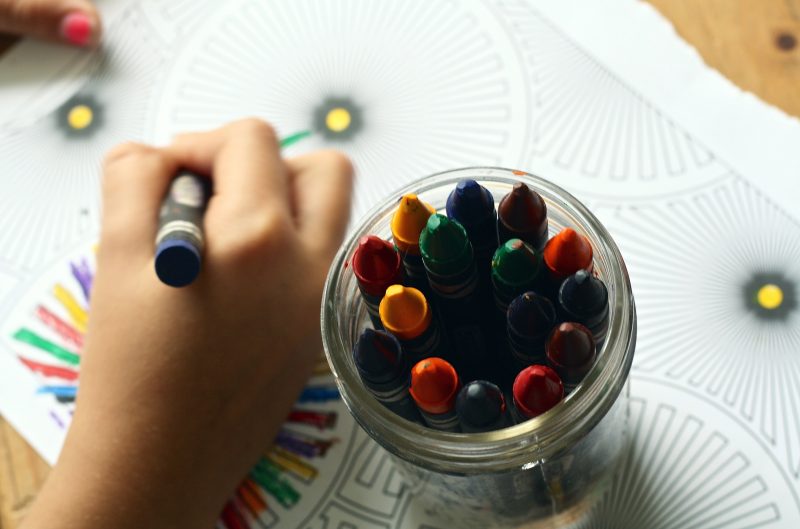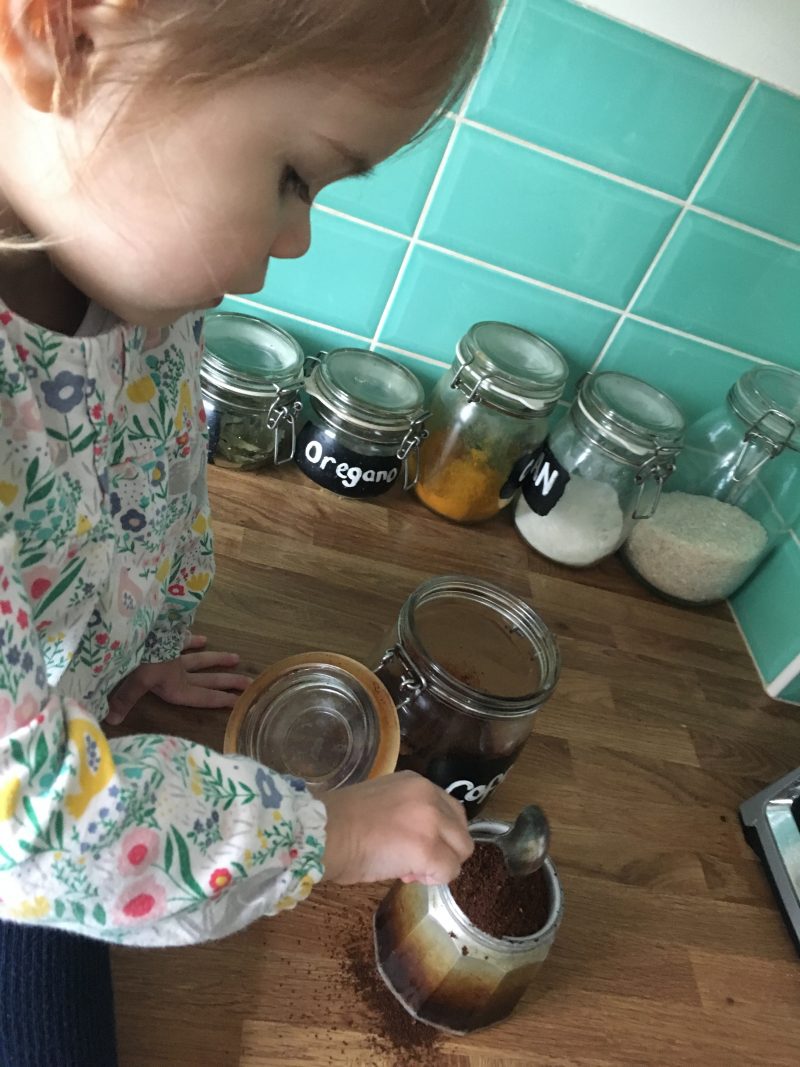 “I’ll do it!”, “No, stop! Don’t help me,” she demands as she wanders between my partner in the kitchen cooking and me tidying in the lounge. She offers, “Can I help?”, and wants to help fold clean laundry or wash the floor – (in my eyes) the most mundane tasks. But I let her, of course I do. Montessori education for my daughter wasn’t something I went looking for and I am no fan of parenting books or rigid ways of how to raise children, but we’ve seen how her nursery has brought with it a calm environment, where children were treated like mini adults. We’ve watched our 3 year old thrive, and her fiery independence grow. Does she do a “good job” in her pursuits? Nope. Laundry is folded a million times and then stuffed in her drawers and there is often something extra for me to clean up but this is lessening as her co-ordination improves. I let her use mild eco hand soap if she’s interested in cleaning and each morning she chops fruit for smoothies or fills the coffee percolator.
“I’ll do it!”, “No, stop! Don’t help me,” she demands as she wanders between my partner in the kitchen cooking and me tidying in the lounge. She offers, “Can I help?”, and wants to help fold clean laundry or wash the floor – (in my eyes) the most mundane tasks. But I let her, of course I do. Montessori education for my daughter wasn’t something I went looking for and I am no fan of parenting books or rigid ways of how to raise children, but we’ve seen how her nursery has brought with it a calm environment, where children were treated like mini adults. We’ve watched our 3 year old thrive, and her fiery independence grow. Does she do a “good job” in her pursuits? Nope. Laundry is folded a million times and then stuffed in her drawers and there is often something extra for me to clean up but this is lessening as her co-ordination improves. I let her use mild eco hand soap if she’s interested in cleaning and each morning she chops fruit for smoothies or fills the coffee percolator.
On days where you have nothing to rush for, you can slow down and relax; children love to be with their parents; to be given freedom and a sense of control over their lives, which in turn reduces stress and anxiety. I’ve not only learned a lot about our daughter but saved money and time by not hurrying from place to place in the city. Children really do have just as good a day helping you clean the car or weed the garden.
“Never help a child with a task at which he feels he can succeed.” Maria Montessori
If you want children to naturally help with housework as they grow then don’t stop them now. Don’t worry about it being right, messy or imperfect – it builds their confidence in their own abilities and teaches them to care for their environment. Children love real life items and play – I let our daughter use breakable items that aren’t precious so I don’t care if they get broken, but at the same time I teach her how to care for delicate things. What matters, is that she is autonomous in her own little world.
While I see many parents set up incredible looking invitations to play for their children which allows them time to get on with house work or have time for themselves, it doesn’t feel right for me. The packs of stickers and pom poms, glitter and storage boxes of preschool entertainment, simply feel like extras to think about. More money spent and more “stuff” to store that our little house can’t home, and a growing environmental conscience questions. Is there really a need for these disposable play items?
 5 Tips to Foster Independence and Real Life Play
5 Tips to Foster Independence and Real Life Play
Follow your child
Like all areas of learning, your child with have specific interests. Maybe they’ll enjoy washing the car, helping in the kitchen or stacking the dishwasher. Ask them if they’d like to help and they won’t always want to. Give them the option eg: “would you like to help me do or, would you like to play in the garden/living room instead?” You might be surprised by the response.
Build their confidence
Your child may not quite have the coordination or strength skills to do what they’d like to do. That’s ok, let them have a go and use phrases like “I can see you’re trying/concentrating really hard but it is heavy/difficult, would you like me to help?” or “maybe I’ll start and you finish or I’ll do that bit and you do the next”. Don’t put them off but encourage them to use their other skills.
Recycle/reuse and reduce waste
Pick up some cheap charity shop items like a china tea-set. They will love that they can use breakables and delicate items and also see you’re relaxed about that. You’re not investing in plastic items that are adding to landfill and of course always teach them about safety and sharp edges too.
Talk about the environment
Teach them that it’s their environment too! Children will learn to take care of their surroundings and belongings by being tidy and clean – you can weave in a bit about not being wasteful, saving water and talk about food hygiene and nutrition as well.
Helpful and kind
Make comments on how helpful they are by helping you do certain task and how kind or thoughtful they’re being. This will make them feel proud of themselves and raise their self-esteem as well as awareness of helping others.
Thank you so much, Katie. Such fascinating stuff. Do you practice any of the above? Are you interested in Montessori education?
P.S A Slow Day in the Life and 4 Slow Living Tips to Change your Life
———
Katie Bowden is trying to stay in the slow lane in the city and is always thinking about mental wellbeing. She is a psychology student and mother, and blogs over at Her Village Bristol.

